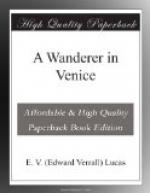In the daytime the population of the Piazza is more foreign than Venetian. In fact the only Venetians to be seen are waiters, photographers, and guides, the knots of errand boys watching the artists, and, I might add, the pigeons. But at night Venice claims it, although the foreigner is there too. It is amusing to sit at a table on the outside edge of Florian’s great quadrangle of chairs and watch the nationalities, the Venetians, the Germans, the Austrians, and the Anglo-Saxons, as they move steadily round and round. Venice is, of course, the paradise both of Germans and Austrians. Every day in the spring and summer one or two steamers arrive from Trieste packed with Austrian tourists awfully arrayed. Some hundreds have to return to Trieste at 2 o’clock; other hundreds remain till night. The beautiful word Venezia, which we cheapen but not too cruelly to Venice and the French soften to Venise, is alas! to Teutonic tongues Venedig.
The Venetians reach the Square first, smart, knowing, confident, friendly, and cheerful; then the Germans and Austrians, very obviously trippers; and then, after their hotel dinners, at about quarter past nine, the English: the women with low necks, the men in white shirts, talking a shade too loud, monarchs of all they survey. But the honeymooners are the best—the solicitous young bridegrooms from Surbiton and Chislehurst in their dinner-jackets and black ties; their slender brides, with pretty wraps on their heads, here probably for the last or the first time, and so determined to appear Continental and tolerant, bless their hearts! They walk round and round, or sit over their coffee, and would be so happy and unselfconscious and clinging were it not for the other English here.
The fine republicanism of Venice is nowhere so apparent as on band nights. Such aristocrats as the city holds (and judging from the condition of the palaces to-day, there cannot be many now in residence) either look exactly like the middle classes or abstain from the Piazza. The prevailing type is the well-to-do citizen, very rarely with his women folk, who moves among street urchins at play; cigar-end hunters; soldiers watchful for officers to salute; officers sometimes returning and often ignoring salutes; groups of slim upright Venetian girls in the stately black shawls, moving, as they always do, like queens; little uniformed schoolboys in “crocodiles”; a policeman or two; a party from the country; a workman with his wife and babies (for though the Venetians adore babies they see no incongruity in keeping them up till ten o’clock); epauletted and cockhatted gendarmes; and at intervals, like ghosts, officials from the arsenal, often alone, in their spotless white linen.




